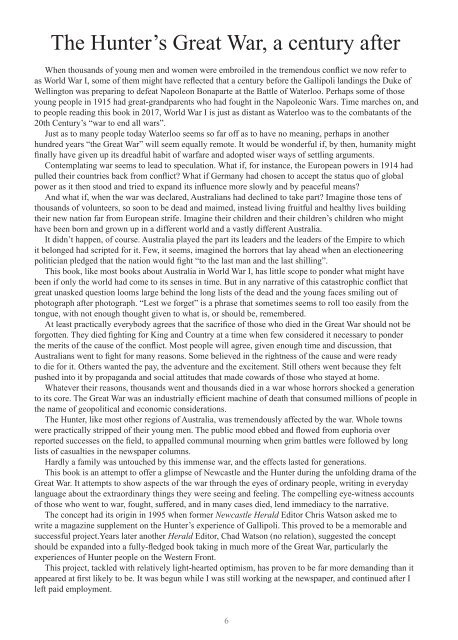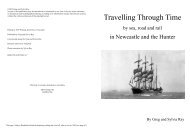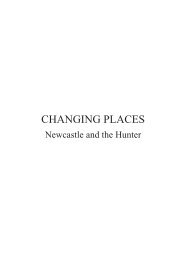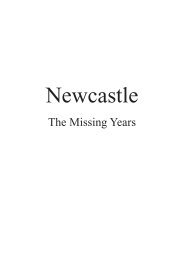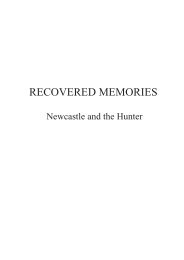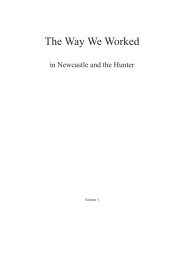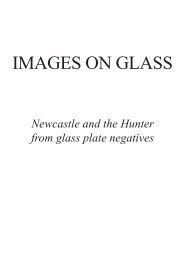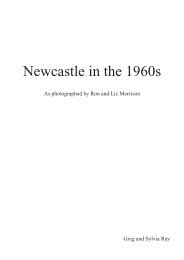Create successful ePaper yourself
Turn your PDF publications into a flip-book with our unique Google optimized e-Paper software.
The <strong>Hunter</strong>’s <strong>Great</strong> <strong>War</strong>, a century after<br />
When thousands of young men and women were embroiled <strong>in</strong> <strong>the</strong> tremendous conflict we now refer to<br />
as World <strong>War</strong> I, some of <strong>the</strong>m might have reflected that a century before <strong>the</strong> Gallipoli land<strong>in</strong>gs <strong>the</strong> Duke of<br />
Well<strong>in</strong>gton was prepar<strong>in</strong>g to defeat Napoleon Bonaparte at <strong>the</strong> Battle of Waterloo. Perhaps some of those<br />
young people <strong>in</strong> 1915 had great-grandparents who had fought <strong>in</strong> <strong>the</strong> Napoleonic <strong>War</strong>s. Time marches on, and<br />
to people read<strong>in</strong>g this book <strong>in</strong> 2017, World <strong>War</strong> I is just as distant as Waterloo was to <strong>the</strong> combatants of <strong>the</strong><br />
20th Century’s “war to end all wars”.<br />
Just as to many people today Waterloo seems so far off as to have no mean<strong>in</strong>g, perhaps <strong>in</strong> ano<strong>the</strong>r<br />
hundred years “<strong>the</strong> <strong>Great</strong> <strong>War</strong>” will seem equally remote. It would be wonderful if, by <strong>the</strong>n, humanity might<br />
f<strong>in</strong>ally have given up its dreadful habit of warfare and adopted wiser ways of settl<strong>in</strong>g arguments.<br />
Contemplat<strong>in</strong>g war seems to lead to speculation. What if, for <strong>in</strong>stance, <strong>the</strong> European powers <strong>in</strong> 1914 had<br />
pulled <strong>the</strong>ir countries back <strong>from</strong> conflict? What if Germany had chosen to accept <strong>the</strong> status quo of global<br />
power as it <strong>the</strong>n stood and tried to expand its <strong>in</strong>fluence more slowly and by peaceful means?<br />
And what if, when <strong>the</strong> war was declared, Australians had decl<strong>in</strong>ed to take part? Imag<strong>in</strong>e those tens of<br />
thousands of volunteers, so soon to be dead and maimed, <strong>in</strong>stead liv<strong>in</strong>g fruitful and healthy lives build<strong>in</strong>g<br />
<strong>the</strong>ir new nation far <strong>from</strong> European strife. Imag<strong>in</strong>e <strong>the</strong>ir children and <strong>the</strong>ir children’s children who might<br />
have been born and grown up <strong>in</strong> a different world and a vastly different Australia.<br />
It didn’t happen, of course. Australia played <strong>the</strong> part its leaders and <strong>the</strong> leaders of <strong>the</strong> Empire to which<br />
it belonged had scripted for it. Few, it seems, imag<strong>in</strong>ed <strong>the</strong> horrors that lay ahead when an electioneer<strong>in</strong>g<br />
politician pledged that <strong>the</strong> nation would fight “to <strong>the</strong> last man and <strong>the</strong> last shill<strong>in</strong>g”.<br />
This book, like most books about Australia <strong>in</strong> World <strong>War</strong> I, has little scope to ponder what might have<br />
been if only <strong>the</strong> world had come to its senses <strong>in</strong> time. But <strong>in</strong> any narrative of this catastrophic conflict that<br />
great unasked question looms large beh<strong>in</strong>d <strong>the</strong> long lists of <strong>the</strong> dead and <strong>the</strong> young faces smil<strong>in</strong>g out of<br />
photograph after photograph. “Lest we forget” is a phrase that sometimes seems to roll too easily <strong>from</strong> <strong>the</strong><br />
tongue, with not enough thought given to what is, or should be, remembered.<br />
At least practically everybody agrees that <strong>the</strong> sacrifice of those who died <strong>in</strong> <strong>the</strong> <strong>Great</strong> <strong>War</strong> should not be<br />
forgotten. They died fight<strong>in</strong>g for K<strong>in</strong>g and Country at a time when few considered it necessary to ponder<br />
<strong>the</strong> merits of <strong>the</strong> cause of <strong>the</strong> conflict. Most people will agree, given enough time and discussion, that<br />
Australians went to fight for many reasons. Some believed <strong>in</strong> <strong>the</strong> rightness of <strong>the</strong> cause and were ready<br />
to die for it. O<strong>the</strong>rs wanted <strong>the</strong> pay, <strong>the</strong> adventure and <strong>the</strong> excitement. Still o<strong>the</strong>rs went because <strong>the</strong>y felt<br />
pushed <strong>in</strong>to it by propaganda and social attitudes that made cowards of those who stayed at home.<br />
Whatever <strong>the</strong>ir reasons, thousands went and thousands died <strong>in</strong> a war whose horrors shocked a generation<br />
to its core. The <strong>Great</strong> <strong>War</strong> was an <strong>in</strong>dustrially efficient mach<strong>in</strong>e of death that consumed millions of people <strong>in</strong><br />
<strong>the</strong> name of geopolitical and economic considerations.<br />
The <strong>Hunter</strong>, like most o<strong>the</strong>r regions of Australia, was tremendously affected by <strong>the</strong> war. Whole towns<br />
were practically stripped of <strong>the</strong>ir young men. The public mood ebbed and flowed <strong>from</strong> euphoria over<br />
reported successes on <strong>the</strong> field, to appalled communal mourn<strong>in</strong>g when grim battles were followed by long<br />
lists of casualties <strong>in</strong> <strong>the</strong> newspaper columns.<br />
Hardly a family was untouched by this immense war, and <strong>the</strong> effects lasted for generations.<br />
This book is an attempt to offer a glimpse of Newcastle and <strong>the</strong> <strong>Hunter</strong> dur<strong>in</strong>g <strong>the</strong> unfold<strong>in</strong>g drama of <strong>the</strong><br />
<strong>Great</strong> <strong>War</strong>. It attempts to show aspects of <strong>the</strong> war through <strong>the</strong> eyes of ord<strong>in</strong>ary people, writ<strong>in</strong>g <strong>in</strong> everyday<br />
language about <strong>the</strong> extraord<strong>in</strong>ary th<strong>in</strong>gs <strong>the</strong>y were see<strong>in</strong>g and feel<strong>in</strong>g. The compell<strong>in</strong>g eye-witness accounts<br />
of those who went to war, fought, suffered, and <strong>in</strong> many cases died, lend immediacy to <strong>the</strong> narrative.<br />
The concept had its orig<strong>in</strong> <strong>in</strong> 1995 when former Newcastle Herald Editor Chris Watson asked me to<br />
write a magaz<strong>in</strong>e supplement on <strong>the</strong> <strong>Hunter</strong>’s experience of Gallipoli. This proved to be a memorable and<br />
successful project.Years later ano<strong>the</strong>r Herald Editor, Chad Watson (no relation), suggested <strong>the</strong> concept<br />
should be expanded <strong>in</strong>to a fully-fledged book tak<strong>in</strong>g <strong>in</strong> much more of <strong>the</strong> <strong>Great</strong> <strong>War</strong>, particularly <strong>the</strong><br />
experiences of <strong>Hunter</strong> people on <strong>the</strong> Western Front.<br />
This project, tackled with relatively light-hearted optimism, has proven to be far more demand<strong>in</strong>g than it<br />
appeared at first likely to be. It was begun while I was still work<strong>in</strong>g at <strong>the</strong> newspaper, and cont<strong>in</strong>ued after I<br />
left paid employment.<br />
6


